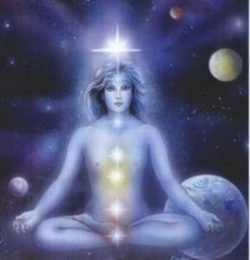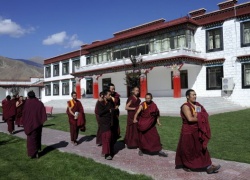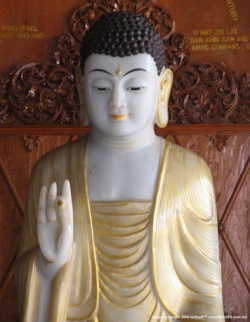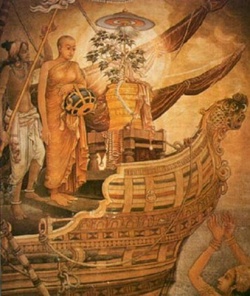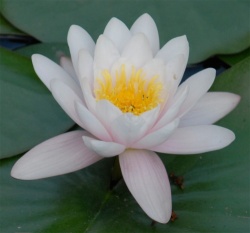Difference between revisions of "Ten Dharma Realms"
(Created page with "The '''Ten Dharma Realms''' (ten spiritual realms) are part of the belief of some forms of Buddhism that there are ten conditions of life which sentient beings are subject...") |
|||
| (15 intermediate revisions by 2 users not shown) | |||
| Line 1: | Line 1: | ||
| − | + | [[File:Mantras145.jpg|thumb|250px|]]{{DisplayImages|2105|1781|2559|3070|1036}} | |
| − | |||
| − | |||
| − | |||
| − | |||
| − | |||
| − | |||
| − | |||
| − | |||
| − | |||
| − | |||
| − | + | ==[[Dharma Realm]]== | |
| − | This | + | This is the general term for the "things", [[noumenal]] or [[phenomenal]]. In [[Buddhism]], there are ten states of [[existence]], which are also called [[Ten Dharma Realms]]. Each [[Dharma realm]] has its [[own]] [[characteristics]], and its [[existence]] is attributed to the retribution of the [[beings]]. These [[ten realms]] do not appear to be discrete in their [[forms]], as their [[existence]] is virtually determined by the [[state of mind]]. Therefore, it is important to note that the ten [[Dharma realms]] are not beyond a single [[thought]]. |
| − | |||
| − | + | The lowest [[six realms]] are known as the [[Six Paths]] or [[Six Realms]]. These [[six states of existence]] are subjected to [[birth]] and [[death]], and then [[rebirth]] for many [[lives]]. One's [[state]] of [[existence]] depends on one's [[karmic]] [[activities]]. With [[evil]] [[karmic]] power, one will be born in the [[lowest three realms]], known as [[Three Evil Path]] (of [[transmigration]]). With good and kind [[karma]], one will be born in the upper [[three realms]], known as [[Three Good Paths]] (of [[transmigration]]). | |
| − | + | The [[upper four realms]] are known as the [[Four Holy Realms]]. These [[four states of existence]] are beyond [[birth]] and [[death]] and {{Wiki|liberated}} from the Samara. | |
| − | |||
| − | + | ===[[Hell]]=== | |
| − | + | [[Suffering]] is most severe, continuous and everlasting. Those [[beings]] must have committed unforgiveable and [[evil]] [[deed]], with no [[regret]] or [[repent]]. The [[evil karma]] determines their [[existence]] in [[hell]]. They [[suffer]] until they are completely retributed or the [[evil karma]] vanishes. However, for those who committed the [[Five Offenses]], they will stay in [[hell]] without any specific [[time]] to be {{Wiki|liberated}}. | |
| − | |||
| − | + | ===[[Ghost]]=== | |
| − | + | In this [[realm]], most of the [[ghosts]] always live in the {{Wiki|atmosphere}} of [[anxiety]], [[illusion]] and {{Wiki|fear}}. Their [[desires]] are never satisfied. The [[hungry ghosts]] cannot eat as their {{Wiki|throat}} is as narrow as a pin, but their {{Wiki|stomach}} is as large as a [[drum]]. Apart from [[hungry ghosts]], there are also [[Yaksa]], [[Raksa]], [[Spiritual]] [[Ghosts]], etc.. [[Spiritual]] [[ghosts]] are dwelling in the [[nature]], e.g. [[trees]], [[mountains]] and seas, and protecting the creatures, while [[Yaksa]] and [[Raksa]] are [[evil]], malignant and [[violent]]. | |
| − | + | ===[[Animal]]=== | |
| − | |||
| − | + | It is a special [[path]]. All the [[beings]] within the [[Six Realms]] which do not belong to any other five [[realms]] are categorized in this [[path]]. [[Animals]] can [[exist]] in all other [[five paths]]. | |
| − | + | [[Animals]] have minimal [[intelligence]] and [[consciousness]]. They live in adaption to the [[nature]]. As their {{Wiki|behavior}} follows {{Wiki|instinct}} without {{Wiki|deliberation}}, their [[karma]] is [[neutral]], i.e. neither good nor [[evil]]. | |
| − | |||
| − | + | === [[Asura]]=== | |
| − | + | It is a peculiar [[path]] in the Six [[paths]]. In terms of material [[enjoyment]] and [[psychic power]], it is similar to [[Deva]]. However, in some aspects, it is even worse than [[Human]] [[Path]]. The {{Wiki|male}} [[Asura]] is extremely ugly, while the {{Wiki|female}} is as beautiful as an {{Wiki|angel}}. The {{Wiki|male}} [[Asura]] always fights with each other as they are {{Wiki|cruel}} and [[furious]]. They are proud of themselves, and reluctant to learn and practise the [[Buddhist teachings]]. | |
| − | |||
| − | + | ===Man=== | |
| − | + | It is the [[Dhama realm]] which we are most familiar with. In this [[realm]], we have both [[happiness]] and [[suffering]]. It is a material [[world]], and the [[mind]] [[activities]] are always connected with the {{Wiki|principles}} of {{Wiki|matter}}. [[Joy]] and [[happiness]] are limited as freedom is also limited by the [[body]] and other {{Wiki|sensual}} {{Wiki|organs}} of a man. On the other hand, [[suffering]] can be the main [[cause]] or [[condition]] to allow man to possess a kind [[heart]], thus to pursue the [[Buddhist Way]]. In this [[respect]], Man [[Path]] is better than [[Deva]] [[Path]]. | |
| − | + | ===[[Deva]]=== | |
| − | |||
| − | + | It is a [[heaven]] for those who are [[wise]] and kind as the retribution for their good [[deed]]. Their major [[desires]] will be satisfied. In this [[path]], it is divided into Three [[Heavenly Realms]], namely [[Desire Heaven Realm]], [[Form]] (or [[Rupa]]) [[Heaven Realm]], [[Formless]] (or [[Arupa]]) [[Heaven Realm]]. In the [[Desire Heaven Realm]], the [[living beings]] have strong [[desire]] in material and can be easily and fully satisfied with [[enjoyment]]. In the [[Form Heaven Realm]], the [[living beings]] are not [[interested]] in material. Instead, their [[bodies]] and [[mind]] pursue the [[spiritual]] [[happiness]], such as [[philosophy]], [[music]], [[art]] and [[meditation]]. | |
| − | + | In the [[Formless Heaven Realm]], the [[living beings]] do not attach to the material nor their [[own]] [[bodies]]. They are free from any [[hindrances]], and they live in a [[state]] of [[joy]], freedom and [[psychic power]]. It is the [[wisdom]] and the [[karma]] of the [[Deva]] to determine which [[heaven realm]] they live in. | |
| − | |||
| − | + | ===[[Sravaka]] ([[Sound-Hearer]] [[Arhat]])=== | |
| − | + | It is the first [[path]] of the [[Four Holy Paths]] (or [[Four Sagely Paths]]). An [[Arhat]] is one who has [[attained]] the [[renunciation]] of all [[desires]] and no [[attachment]] to anything. Thus he will be {{Wiki|liberated}} from the [[reincarnation of the Six Paths]] as soon as his [[karmic]] [[causes]] are completely retributed. In this [[path]], it is the [[joyful]] [[state]] of [[existence]] beyond the [[worldly]] [[birth]] and [[death]] because they are [[enlightened]] that the [[worldly phenomena]] are unreal and impermenent. [[Sravaka]] is [[enlightened]] while they listen to the [[Four Noble Truths]]. Therefore, it is also known as [[Sound-Hearer]] [[Arhat]]. | |
| − | |||
| − | + | === [[Praetyka-Buddha]] (Those [[enlightened]] to [[conditions]])=== | |
| − | + | [[Praetyka-Buddha]] is also an [[Arhat]], but more {{Wiki|superior}} to the [[Sravaka]]. They are [[enlightened]] by [[understanding]] the Law of [[Dependent Originations]] or the [[Twelve Links of Dependent Originations]]. | |
| + | |||
| + | [[Arhat]] is devided into four grades of [[arhatship]] or [[fruitions]] or [[phala]]. | ||
| + | |||
| + | * [[Srota-aparnna]] --- the [[one who has entered the stream]] of {{Wiki|holy}} living. It is the first stage of the [[arhat]], that of a [[Sravaka]]. | ||
| + | * [[Sakradagamin]] --- the one who comes to be born once more. It is the second grade of [[arhatship]] involving only one [[birth]]. | ||
| + | * [[Anagamin]] --- the one who will not be [[reborn]] in this [[world]] (i.e. [[Six Paths]]), but in the [[Form Realm]] or [[Formless Realm]], where he will attain to [[Nirvana]]. | ||
| + | * [[Arhan]] --- the one who enters [[Nirvana]]. All [[Karma]] of [[reincarnation]] is destroyed. He also reaches a [[state]] of no-lower {{Wiki|learning}}. He is the [[highest]] [[Saint]] in [[Hinayana]] in contrast with the [[Bodhisattva]] as the [[saint]] in [[Mahayana]]. | ||
| + | |||
| + | ===[[Bodhisattva]]=== | ||
| + | |||
| + | [[Bodhisattva]] is an [[enlightened being]]. However, he has the {{Wiki|affection}} to other [[sentient beings]]. With his [[Four Immeasurable Minds]], he practises the [[Six Paramitas]] to cross over the [[sentient beings]] from [[suffering]]. What [[Bodhisattvas]] do is to [[enlighten]] themselves, and [[enlighten]] others, [[benefit]] themselves and [[benefit]] others. They cross over the [[sentient beings]] in pursuit of [[attainment of Buddhahood]]. All these relationships are mutual and [[interdependent]]. | ||
| + | |||
| + | All [[Bodhisattvas]] do not [[take refuge]] in [[Nirvana]]. They commit themselves, by their great [[vows]], to be [[reborn]] in any [[Dharma Realm]] to rescue the [[sentient beings]]. | ||
| + | |||
| + | There are [[ten stages]] or grades of [[Bodhisattva]] depending on the extent of their [[merits]] and [[virtues]]. | ||
| + | |||
| + | === [[Buddha]]=== | ||
| + | |||
| + | "If there are [[people]] who wish to understand all [[Buddhas]] of the [[three periods]] of [[time]] they should [[contemplate]] the [[nature]] of [[Dharma Realm]]. The [[Tathagatas]] ([[Buddhas]]) are made from [[mind]] alone." | ||
| + | |||
| + | [[Buddha]] is the [[highest]] [[state]] of [[existence]] of all [[sentient beings]]. There are many many titles of [[Buddha]], but the most common ones are summarized in [[Ten Titles of Buddha]], which respresent the [[characteristic]] of [[Buddha]]. | ||
| + | |||
| + | The [[Ten Titles of Buddha]] are: | ||
| + | |||
| + | # [[Tathagata]] --- the [[Thus Come Ones]] | ||
| + | # [[Arhat]] --- [[Worthy of offerings]] | ||
| + | # [[Samyak-sambuddha]] --- Of proper and [[universal]] [[knowledge]] | ||
| + | # [[Vidyacarva-sampauna]] --- {{Wiki|perfect}} in [[understanding]] and conduct | ||
| + | # [[Sugata]] --- [[skilful]] in leaving the [[world]] through [[liberation]] | ||
| + | # [[Lokavid]] --- {{Wiki|perfect}} and complete [[understanding]] of all [[worldly]] [[Dharma]] | ||
| + | # [[Anuttara]] --- [[unsurpassed]] kights | ||
| + | # [[Purusa-damya-sarathi]] --- taming heroes | ||
| + | # [[Sasta deramanusyanam]] --- [[teachers]] of [[gods]] and [[people]] | ||
| + | # [[Buddha-lokanatha]] or [[Bhagavan]] --- [[Buddha]], the [[World Honoured Ones]] | ||
| + | |||
| + | [[Buddha]] also has [[Ten Powers]], which enables him to cross over the [[living beings]], to perform all kinds of [[merits]] and [[virtues]] with [[psychic power]] and to dwell in [[liberation]] without [[hindrance]]. | ||
| + | |||
| + | [[Buddha]] treats all kinds of [[living beings]] to be {{Wiki|equal}}. In the course of preaching and crossing over. [[Buddha]] is [[fearless]] and confident to overcome all difficulties. It is known as Four [[Fearlessness]]. | ||
| + | |||
| + | There are also [[Eighteen Different Characters of a Buddha]] as compared with [[Bodhisattva]] and other [[beings]] in [[Dharma Realms]]. | ||
| + | |||
| + | [[Buddha]] has a threefold [[body]] | ||
| + | |||
| + | # [[Dharma body]] --- the [[Buddha-body]] in its [[essential]] [[nature]] | ||
| + | # [[Retribution body]] --- a [[body]] of [[bliss]], which he/she "receives" for his/her [[own]] "use" and differentiation from all other [[Buddha]] | ||
| + | # Response and [[transformation body]] --- [[Buddha]] can appear in any [[form]] to cross over the [[sentient beings]]. | ||
| + | |||
| + | Though [[Buddha]] is the [[highest]] [[enlightened beings]] with unconceiveable [[spiritual power]], he is unable to do the following: | ||
| + | |||
| + | * to eliminate or change the [[karmic]] retribution | ||
| + | * to cross over those who reject [[Buddhism]] | ||
| + | * to cross over the entire [[sentient beings]] in the [[Dharma Realms]] | ||
{{R}} | {{R}} | ||
| + | [http://www.buddhistdoor.com/OldWeb/bdoor/archive/nutshell/teach4.htm www.buddhistdoor.com] | ||
| + | {{NewSourceBreak}} | ||
| + | ;[[Ten Dharma Realms]] | ||
| + | |||
| + | also known as [[ten states of existence]], which are | ||
| + | |||
| + | : 1 [[Hell]] | ||
| + | : 2 [[Ghost]] | ||
| + | : 3 [[Animal]] | ||
| + | : 4 [[Asura]] | ||
| + | : 5 Man | ||
| + | : 6 [[Deva]] | ||
| + | : 7 [[Sravaka]] ([[Sound-Hearer]] [[Arhat]]) | ||
| + | : 8 [[Praetyka-Buddha]] | ||
| + | : 9 [[Bodhisattva]] | ||
| + | : 10 [[Buddha]] | ||
| + | |||
| + | Each [[Dharma realm]] has its [[own]] {{Wiki|characteristics}}, and its [[existence]] is attributed to the retribution of the [[beings]]. The lowest [[six realms]] (1-6) are known as the Six [[Paths]] or [[Six Realms]]. These [[six states]] of [[existence]] are subjected to [[birth]] and [[death]], and then [[rebirth]] for many [[lives]]. The upper four [[realms]] are known as the [[Four Holy Realms]]. These four states of [[existence]] are [[beyond]] [[birth]] and [[death]] and {{Wiki|liberated}} from the [[Samsara]] | ||
| + | |||
| + | {{Nolinking|For details, please refer to Part 2 of Buddhism In A Nutshell, which appeared in Vol. 1 No. 4 of Buddhist Door, March 1996.}} | ||
| + | |||
| + | {{SeeAtEnd|Ten spiritual realms}} | ||
[[Category:Ten Dharma Realms]] | [[Category:Ten Dharma Realms]] | ||
| + | {{BuddhismbyNumber}}{{BuddhismbyNumber}} | ||
| + | [[Category:Six Realms]] | ||
Latest revision as of 05:50, 2 April 2024
Dharma Realm
This is the general term for the "things", noumenal or phenomenal. In Buddhism, there are ten states of existence, which are also called Ten Dharma Realms. Each Dharma realm has its own characteristics, and its existence is attributed to the retribution of the beings. These ten realms do not appear to be discrete in their forms, as their existence is virtually determined by the state of mind. Therefore, it is important to note that the ten Dharma realms are not beyond a single thought.
The lowest six realms are known as the Six Paths or Six Realms. These six states of existence are subjected to birth and death, and then rebirth for many lives. One's state of existence depends on one's karmic activities. With evil karmic power, one will be born in the lowest three realms, known as Three Evil Path (of transmigration). With good and kind karma, one will be born in the upper three realms, known as Three Good Paths (of transmigration).
The upper four realms are known as the Four Holy Realms. These four states of existence are beyond birth and death and liberated from the Samara.
Hell
Suffering is most severe, continuous and everlasting. Those beings must have committed unforgiveable and evil deed, with no regret or repent. The evil karma determines their existence in hell. They suffer until they are completely retributed or the evil karma vanishes. However, for those who committed the Five Offenses, they will stay in hell without any specific time to be liberated.
Ghost
In this realm, most of the ghosts always live in the atmosphere of anxiety, illusion and fear. Their desires are never satisfied. The hungry ghosts cannot eat as their throat is as narrow as a pin, but their stomach is as large as a drum. Apart from hungry ghosts, there are also Yaksa, Raksa, Spiritual Ghosts, etc.. Spiritual ghosts are dwelling in the nature, e.g. trees, mountains and seas, and protecting the creatures, while Yaksa and Raksa are evil, malignant and violent.
Animal
It is a special path. All the beings within the Six Realms which do not belong to any other five realms are categorized in this path. Animals can exist in all other five paths.
Animals have minimal intelligence and consciousness. They live in adaption to the nature. As their behavior follows instinct without deliberation, their karma is neutral, i.e. neither good nor evil.
Asura
It is a peculiar path in the Six paths. In terms of material enjoyment and psychic power, it is similar to Deva. However, in some aspects, it is even worse than Human Path. The male Asura is extremely ugly, while the female is as beautiful as an angel. The male Asura always fights with each other as they are cruel and furious. They are proud of themselves, and reluctant to learn and practise the Buddhist teachings.
Man
It is the Dhama realm which we are most familiar with. In this realm, we have both happiness and suffering. It is a material world, and the mind activities are always connected with the principles of matter. Joy and happiness are limited as freedom is also limited by the body and other sensual organs of a man. On the other hand, suffering can be the main cause or condition to allow man to possess a kind heart, thus to pursue the Buddhist Way. In this respect, Man Path is better than Deva Path.
Deva
It is a heaven for those who are wise and kind as the retribution for their good deed. Their major desires will be satisfied. In this path, it is divided into Three Heavenly Realms, namely Desire Heaven Realm, Form (or Rupa) Heaven Realm, Formless (or Arupa) Heaven Realm. In the Desire Heaven Realm, the living beings have strong desire in material and can be easily and fully satisfied with enjoyment. In the Form Heaven Realm, the living beings are not interested in material. Instead, their bodies and mind pursue the spiritual happiness, such as philosophy, music, art and meditation.
In the Formless Heaven Realm, the living beings do not attach to the material nor their own bodies. They are free from any hindrances, and they live in a state of joy, freedom and psychic power. It is the wisdom and the karma of the Deva to determine which heaven realm they live in.
Sravaka (Sound-Hearer Arhat)
It is the first path of the Four Holy Paths (or Four Sagely Paths). An Arhat is one who has attained the renunciation of all desires and no attachment to anything. Thus he will be liberated from the reincarnation of the Six Paths as soon as his karmic causes are completely retributed. In this path, it is the joyful state of existence beyond the worldly birth and death because they are enlightened that the worldly phenomena are unreal and impermenent. Sravaka is enlightened while they listen to the Four Noble Truths. Therefore, it is also known as Sound-Hearer Arhat.
Praetyka-Buddha (Those enlightened to conditions)
Praetyka-Buddha is also an Arhat, but more superior to the Sravaka. They are enlightened by understanding the Law of Dependent Originations or the Twelve Links of Dependent Originations.
Arhat is devided into four grades of arhatship or fruitions or phala.
- Srota-aparnna --- the one who has entered the stream of holy living. It is the first stage of the arhat, that of a Sravaka.
- Sakradagamin --- the one who comes to be born once more. It is the second grade of arhatship involving only one birth.
- Anagamin --- the one who will not be reborn in this world (i.e. Six Paths), but in the Form Realm or Formless Realm, where he will attain to Nirvana.
- Arhan --- the one who enters Nirvana. All Karma of reincarnation is destroyed. He also reaches a state of no-lower learning. He is the highest Saint in Hinayana in contrast with the Bodhisattva as the saint in Mahayana.
Bodhisattva
Bodhisattva is an enlightened being. However, he has the affection to other sentient beings. With his Four Immeasurable Minds, he practises the Six Paramitas to cross over the sentient beings from suffering. What Bodhisattvas do is to enlighten themselves, and enlighten others, benefit themselves and benefit others. They cross over the sentient beings in pursuit of attainment of Buddhahood. All these relationships are mutual and interdependent.
All Bodhisattvas do not take refuge in Nirvana. They commit themselves, by their great vows, to be reborn in any Dharma Realm to rescue the sentient beings.
There are ten stages or grades of Bodhisattva depending on the extent of their merits and virtues.
Buddha
"If there are people who wish to understand all Buddhas of the three periods of time they should contemplate the nature of Dharma Realm. The Tathagatas (Buddhas) are made from mind alone."
Buddha is the highest state of existence of all sentient beings. There are many many titles of Buddha, but the most common ones are summarized in Ten Titles of Buddha, which respresent the characteristic of Buddha.
The Ten Titles of Buddha are:
- Tathagata --- the Thus Come Ones
- Arhat --- Worthy of offerings
- Samyak-sambuddha --- Of proper and universal knowledge
- Vidyacarva-sampauna --- perfect in understanding and conduct
- Sugata --- skilful in leaving the world through liberation
- Lokavid --- perfect and complete understanding of all worldly Dharma
- Anuttara --- unsurpassed kights
- Purusa-damya-sarathi --- taming heroes
- Sasta deramanusyanam --- teachers of gods and people
- Buddha-lokanatha or Bhagavan --- Buddha, the World Honoured Ones
Buddha also has Ten Powers, which enables him to cross over the living beings, to perform all kinds of merits and virtues with psychic power and to dwell in liberation without hindrance.
Buddha treats all kinds of living beings to be equal. In the course of preaching and crossing over. Buddha is fearless and confident to overcome all difficulties. It is known as Four Fearlessness.
There are also Eighteen Different Characters of a Buddha as compared with Bodhisattva and other beings in Dharma Realms.
- Dharma body --- the Buddha-body in its essential nature
- Retribution body --- a body of bliss, which he/she "receives" for his/her own "use" and differentiation from all other Buddha
- Response and transformation body --- Buddha can appear in any form to cross over the sentient beings.
Though Buddha is the highest enlightened beings with unconceiveable spiritual power, he is unable to do the following:
- to eliminate or change the karmic retribution
- to cross over those who reject Buddhism
- to cross over the entire sentient beings in the Dharma Realms
Source
also known as ten states of existence, which are
- 1 Hell
- 2 Ghost
- 3 Animal
- 4 Asura
- 5 Man
- 6 Deva
- 7 Sravaka (Sound-Hearer Arhat)
- 8 Praetyka-Buddha
- 9 Bodhisattva
- 10 Buddha
Each Dharma realm has its own characteristics, and its existence is attributed to the retribution of the beings. The lowest six realms (1-6) are known as the Six Paths or Six Realms. These six states of existence are subjected to birth and death, and then rebirth for many lives. The upper four realms are known as the Four Holy Realms. These four states of existence are beyond birth and death and liberated from the Samsara
For details, please refer to Part 2 of Buddhism In A Nutshell, which appeared in Vol. 1 No. 4 of Buddhist Door, March 1996.
